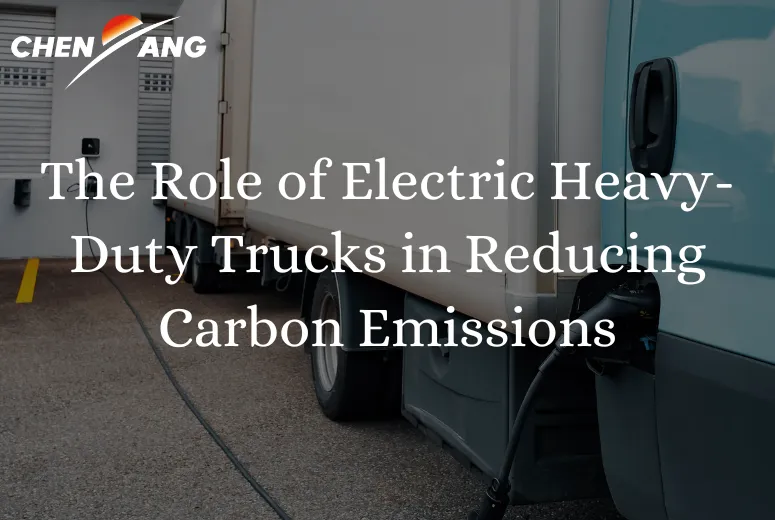The Role of Electric Heavy-Duty Trucks in Reducing Carbon Emissions
As the world confronts the urgent challenge of climate change, industries are increasingly looking for solutions to reduce their environmental impact. The transportation sector, particularly heavy-duty freight, has long been a major contributor to global carbon emissions. Diesel-powered trucks are responsible for a significant portion of these emissions, making them a key target for decarbonization efforts. Electric heavy-duty trucks, with their zero-tailpipe emissions, present a promising solution to address this problem. This article explores the role of electric heavy-duty trucks in reducing carbon emissions and shaping a more sustainable transportation system.

A Major Source of Emissions: The Freight Industry’s Impact About Electric Heavy-Duty Trucks
The freight industry is a cornerstone of global commerce, but it also represents one of the largest sources of greenhouse gas emissions. According to the International Energy Agency (IEA), the freight sector accounts for nearly a quarter of global carbon dioxide emissions from the transportation industry. This is primarily due to the widespread use of diesel trucks, which emit large quantities of carbon dioxide (CO2), nitrogen oxides (NOx), and particulate matter.
With the growing demand for goods and services worldwide, the need to reduce emissions from freight transport has never been more critical. The transition to big heavy truck offers a pathway to significantly reduce these harmful emissions, contributing to global climate goals such as the Paris Agreement's target to limit global warming to below 1.5°C.
Zero-Emission Technology: The Promise of Electric Trucks
Electric heavy-duty trucks are powered by batteries rather than traditional internal combustion engines. This key difference means that they produce no tailpipe emissions, unlike their diesel counterparts, which emit carbon dioxide and other pollutants directly into the atmosphere. By eliminating these emissions, electric trucks can play a crucial role in reducing the overall carbon footprint of the freight industry.
The environmental benefits of heavy load truck extend beyond just reducing carbon emissions. Electric drivetrains are more efficient than diesel engines, converting a higher percentage of energy from the battery into movement. This increased energy efficiency means that electric trucks consume less energy to travel the same distance, further reducing the demand for fossil fuels and the associated emissions.
Battery-Electric Trucks and Renewable Energy Integration About Electric Heavy-Duty Trucks
One of the most promising aspects of electric heavy-duty trucks is their ability to integrate with renewable energy sources. Unlike diesel trucks, which are dependent on fossil fuels, electric trucks can be powered by electricity generated from clean sources such as wind, solar, or hydropower. This creates an opportunity to achieve significant emissions reductions not only from the vehicles themselves but also from the energy grid.
For example, when electric trucks are charged using renewable energy, their overall carbon footprint is further minimized. In regions where renewable energy is abundant and electricity grids are becoming increasingly decarbonized, the environmental benefits of electric trucks are amplified. This synergy between electric trucks and renewable energy can accelerate the transition to a low-carbon economy, creating a more sustainable transportation ecosystem.
Reducing Emissions Across the Freight Supply Chain With Electric Heavy-Duty Trucks
The environmental benefits of electric heavy-duty trucks extend beyond just the vehicles themselves. The transition to electric trucks can lead to broader changes across the freight supply chain that further reduce emissions. For instance, electric trucks are ideal for urban and regional deliveries, where air quality and congestion are major concerns. As cities increasingly look to reduce air pollution and meet climate targets, electric trucks offer a cleaner alternative to diesel vehicles, which contribute to poor air quality and public health issues.
Moreover, electric trucks can help decarbonize logistics operations through fleet electrification. As more companies adopt electric trucks, the overall emissions from freight transport decrease, especially when combined with a shift toward more efficient logistics practices. This could include the optimization of delivery routes, the use of intelligent fleet management systems, and a reduction in unnecessary trips—factors that would collectively lower the carbon intensity of freight transportation.
Overcoming Challenges to Widespread Adoption About Electric Heavy-Duty Trucks
While the environmental benefits of electric heavy-duty trucks are clear, several challenges remain in scaling their adoption across the freight sector. The upfront cost of electric trucks is still higher than that of diesel trucks, which may deter some fleet operators from making the switch. However, as battery technology improves and economies of scale come into play, the cost of electric trucks is expected to decrease, making them more accessible to a broader range of companies.
Another challenge is the lack of charging infrastructure. Long-haul freight routes require a robust network of fast-charging stations to ensure that electric trucks can operate efficiently over long distances. Governments, private companies, and utility providers will need to invest heavily in building out this infrastructure to enable widespread adoption. Fortunately, efforts are already underway to expand charging networks, particularly in urban areas and along major freight corridors.
The limited range of electric trucks compared to diesel vehicles is also a concern, particularly for long-haul trucking. However, advancements in battery technology are steadily improving the range of electric trucks, and with innovations such as ultra-fast charging stations, this challenge is becoming more manageable. Additionally, for many regional and urban logistics companies, the range of electric trucks is already sufficient for daily operations.
-
Low Maintenance + High Availability of Ownership for Mining Dump TruckNewsJul.17,2025
-
Drum Drive Axle + Air Suspension for Electric Tractor TruckNewsJul.17,2025
-
33m Boom + Full Hydraulic Outriggers: Narrow-Site Construction Practices of Mixer Pump TruckNewsJul.17,2025
-
18L Large Drum + Extended Drain Interval of Gear Oil for Heavy Duty TrucksNewsJul.17,2025
-
13m Cargo Space + Polyurethane Insulation: Long-Term Cold Chain Protection Solutions for Refrigerated Semi-Trailers for SaleNewsJul.17,2025
-
10T Water Tank + 2.5MPa Fire Pump Efficiency Analysis of Water Tank Fire TruckNewsJul.17,2025
Popular products

























